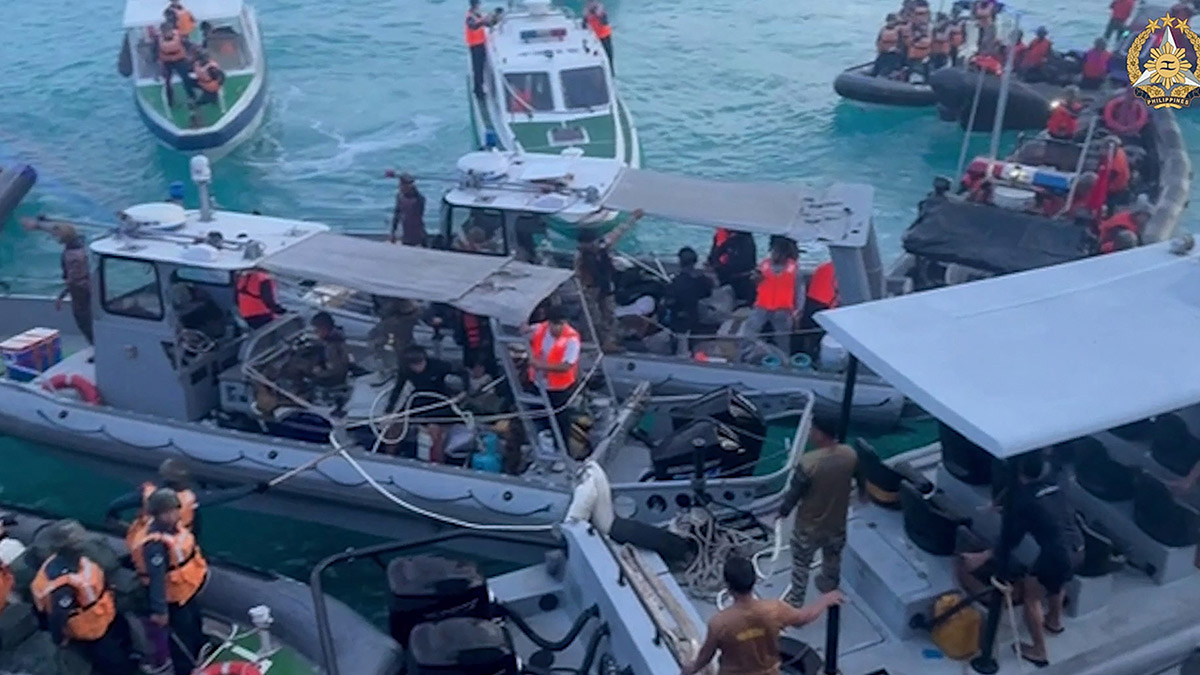Bedan profs: MDT terms for US action already met

This screengrab taken from a handout video filmed on June 17, 2024, and released by Armed Forces of the Philippines-Public Affairs Office on June 19 shows Chinese coast guard personnel (left and right) aboard their inflatable boats blocking Philippine Navy boats (center) during a confrontation at the Second Thomas Shoal in the South China Sea. —Armed Forces of the Philippines-Public Affairs Office
MANILA, Philippines — Law professors from San Beda University have called on the United States to address the “common dangers” in the West Philippine Sea in light of China’s intensified aggression in the disputed waters.
In a statement released on Monday night by the graduate school’s dean, Ranhilio Aquino, the professors said the conditions triggering the Mutual Defense Treaty (MDT) between the Philippines and the United States have already been met.
The academics cited Article IV of the MDT which states that an armed attack in the Pacific Area on either the Philippines and the United States endangers their own peace and safety, and each party commits that it will “act to meet the common dangers in accordance with its constitutional processes.”
READ: AFP chief: China Coast Guard used bolos, acted like pirates
The law professors also noted Article V of the same treaty as saying that an “armed attack” covers those made on the metropolitan territory of either party, on island territories under its jurisdiction in the Pacific, or its armed forces, public vessels, or aircraft in the Pacific.
They further noted that according to Paragraph 14 of the US and Philippines Bilateral Defense Guidelines signed on May 3, 2023, an “armed attack in the Pacific” also includes incidents anywhere in the South China Sea on either Philippine or US armed forces, including their Coast Guards, aircraft, or public vessels.
‘Operative provisions’
Citing the latest incident on June 17 wherein a recorded video clip showed Chinese armed personnel aboard a vessel flying the flag of the People’s Republic of China using bladed weapons against the inflatable craft of the Philippines, the law professors said the conditions that should trigger the application of the treaty provisions have been “fulfilled.”
Considering China’s aggressions, they said the present conditions already trigger the “operative provisions” of the MDT and the United States must consequently “act to meet the common dangers.”
Honor commitment
They clarified, however, that they were not calling for the start of armed fighting, noting that they only wanted the United States to “honor its commitment” under the MDT.
“We do not call for the commencement of armed hostilities but we call on the United States to honor its commitment under the treaty and subsequent agreements pursuant to it to counter the aggression of the People’s Republic of China,” they said.
“Inaction on the part of the United States may lead Filipinos to conclude that the United States is either unwilling or unable to abide by its treaty commitments,” the San Beda professors added.
In her regular press briefing on Monday, Chinese Foreign Ministry spokesperson Mao Ning once again accused the Philippines of illegally intruding into Ren’ai Jiao or Ayungin (Second Thomas) Shoal, which is well within the 370-kilometer exclusive economic zone of the Philippines.
“China has stated what actually happened and made clear its position on the illegal intrusion by Philippine vessels into the adjacent waters of Ren’ai Jiao. Ren’ai Jiao is part of China’s Nansha Qundao. It is Chinese territory,” she claimed.
Mao blamed the Philippines for supposedly initiating provocations and “infringing” on China’s sovereignty.
“While official Chinese pronouncements have always faulted the Philippines, its government and its people with ‘provocation,’ all that Filipino fisherfolk, our naval forces and our Coast Guard have done is to assert those rights adjudged to be rightly ours by the Arbitral Award rendered on July 12, 2016,” the San Beda law professors said, referring to the Philippines winning the arbitration case it lodged against China after the Permanent Court of Arbitration in The Hague, Netherlands, invalidated Beijing’s nine-dash-line claim that covers nearly the entire South China Sea.
The law professors also recommended that President Ferdinand Marcos Jr. bring the issue to the United Nations Security Council and seek its intervention.
For comprehensive coverage, in-depth analysis, visit our special page for West Philippine Sea updates. Stay informed with articles, videos, and expert opinions.


















